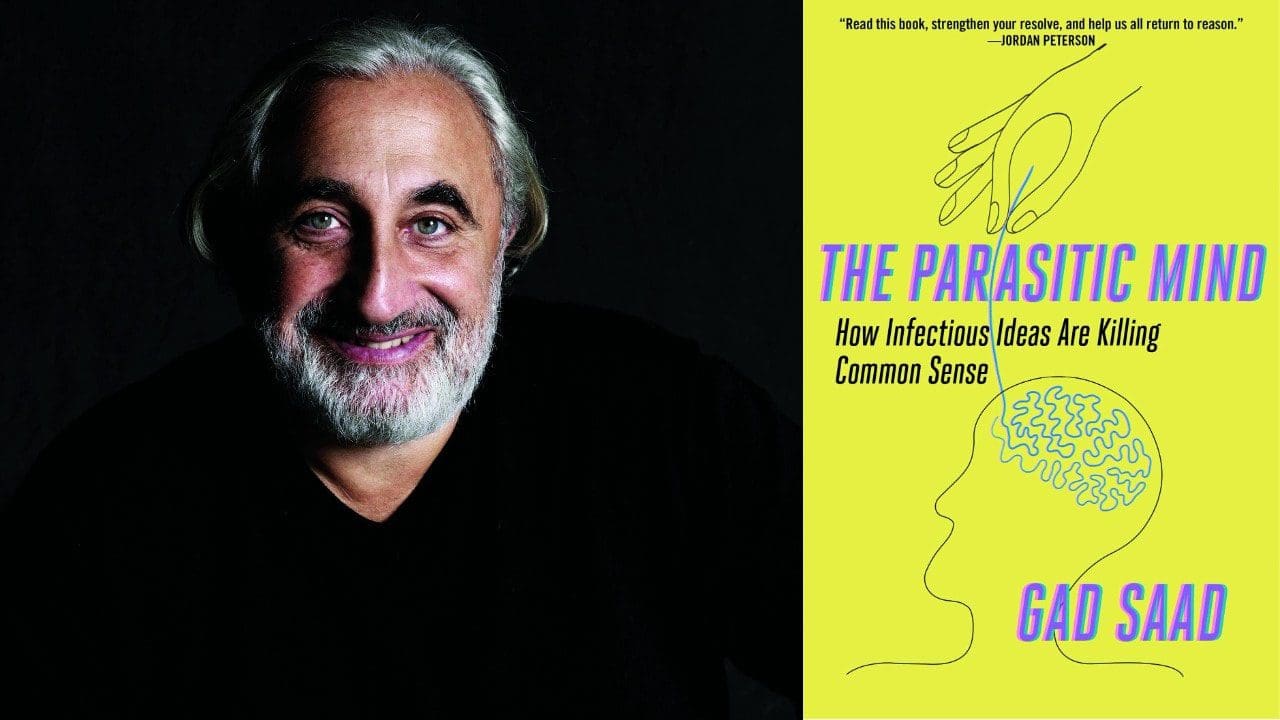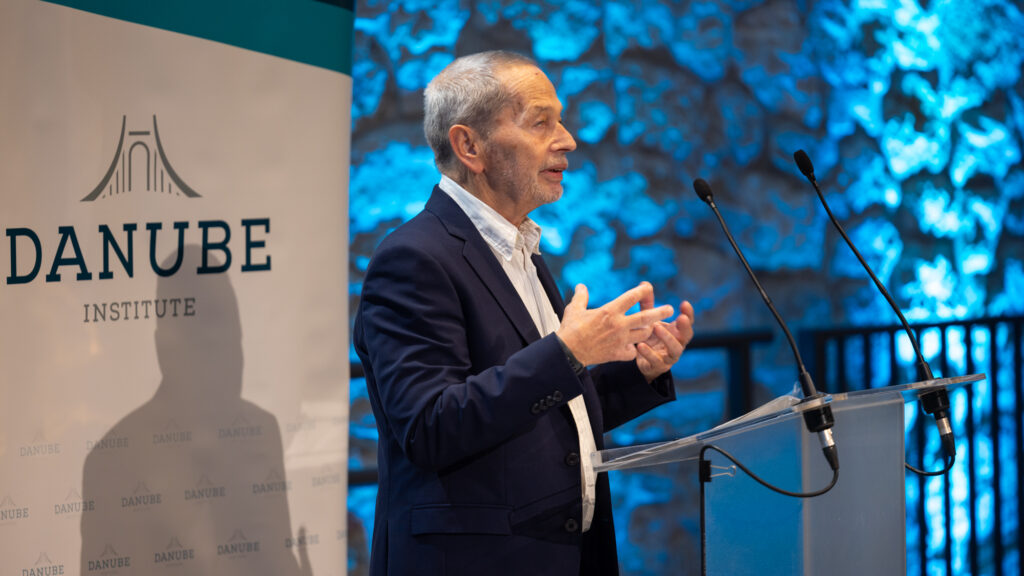Review of Gad Saad’s The Parasitic Mind
A great number of exquisite minds—including Douglas Murray, Helen Pluckrose, and Andy Ngo to name but a few—have recently been addressing the current zeitgeist of leftist lunacy that has engulfed Western societies in the past few decades. But perhaps none has come up with a more fitting metaphor for describing the ongoing phenomena as Gad Saad, the Canadian-Lebanese psychologist, whose latest book is entitled The Parasitic Mind: How Infectious Ideas Are Killing Common Sense (2020). The analogy—equalling the tenets of popular progressivism to malevolent organisms, which spread from host to host— feels even more pertinent now, given that this specific medical terminology has become part of the daily life of everyone on the planet. So it makes sense to build upon this new common knowledge of billions of self-taught virologists when trying to explain something important. Because make no mistake, despite its light-hearted, easy-going tone, this book is definitely one of the most important works of our time.
Professor Saad’s fundamental thesis is that the West is currently suffering from a ‘devastating pandemic, a collective malady that destroys people’s capacity to think rationally’.1 However, the pathogens causing this pandemic are not biological, but rather a collection of unreasonable and harmful ideas, mostly originating from academia and spreading relentlessly into politics, business, popular culture, and nearly every other field of our lives. Saad argues that these ‘idea pathogens’ are slowly eroding our common understanding of reality and truth by enforcing otherwise obvious falsehoods like ‘sex differences are due to social construction, and some women have nine-inch penises’.2
Indeed, cutting edge, satirical humour is an essential tool in Saad’s arsenal. He uses it at every available opportunity, in order to slice through ‘entrenched deposits of nonsensical bullshit’.3 In a world—called ‘Unicornia’ by Saad—in which empirical, scientific truth matters less than the feelings of the professionally hurt, simply citing facts does not seem to be enough: debating such delusional individuals sometimes requires an advanced skillset of sarcasm and jest to make them actually realize their folly, on social media and in academic settings alike.
That is precisely what makes this book so charming. The Parasitic Mind succeeds in presenting vigorously scientific arguments related to a broad range of topics in such an astutely playful manner that even the most detailed exposition of behavioural science and evolutionary psychology feels just as captivating as recent cinema blockbusters. Still, its scientific accuracy is not up for debate. Professor Saad’s life, in his own words, ‘has been shaped by a commitment to two foundational ideals: freedom and truth’.4 This book is no less than a testimony to that personal creed, a manifesto of reason if you will, written by a man who has spent his life fighting the enemies of truth, and now calls on others to take up arms as well. One might ask, what arms? Well, the professor does not send anyone onto the killing grounds of postmodern cancel culture without the equipment necessary to defend the principles of freedom and truth. The Parasitic Mind—much like Douglas Murray’s recent book, The Madness of Crowds —can be considered a manual for our distorted time, not only explaining the many logical fallacies postmodernist progressivism is riddled with, but also demonstrating a number of ways we can counter them while going about our everyday lives. To employ the metaphor supplied by the title, this book is one of the many vaccines we now possess which seek to ‘inoculate people against a class of destructive ideas that destroy our capacity to reason’.6
The ‘pathogens’ of the human mind
What, then, are the ‘pathogens’ of progressive thinking that are wreaking havoc in the Western world? Saad first identifies eight distinct progressive movements and social phenomena (including postmodernism, social constructivism, cultural relativism, political correctness, and identity politics)7 which gave birth to these particular mind parasites, then goes on to break down the specific pathogens in six chapters, explaining their cultural and socio-psychological roots, their means of spreading, and their harmful effects.
No matter how utterly ridiculous most of these logical and ideological fallacies may be, they gain more ground every day without encountering significant resistance
Professor Saad thinks that this is in huge part down to the now institutionalized nature of identity politics in academia, the birthing ground of parasitic progressive ideas. University campuses throughout the West, and especially in North America, have slowly succumbed to the rule of special administrators whose role is to ensure that the manufactured dogmas of diversity, inclusion, and equity (DIE for short) reign supreme in their respective faculties. ‘DIE bureaucrats’ now oversee the application, hiring, and promotion processes, decide who is eligible for publications or awards, and who should not be allowed on campus for being a dangerous Nazi. Saad successfully argues, that ‘freedom of speech, the scientific method, intellectual diversity, and a meritocratic ethos rooted in individual dignity … are non-negotiable elements of a truly enlightened society. A fair society ensures that its members have equality of opportunities and not the equality of outcomes as mandated by DIE edicts.’8 Yet, these diversity cultists—for whom ‘intellectual and political diversity are heretical ideas’9—manage to uphold some of the most radical mind parasites postmodernism has created.
One of these parasites described by Saad is the ‘thinking versus feeling dichotomy’, which creates a false either–or mindset.10 He explains that humans are both cognitive (thinking) and affective (feeling) animals, and we must act consciously when we are relying on one or the other system while judging situations or making decisions. Putting feelings before facts in a scientific environment is a gross violation of truth, yet the practice is increasingly prevalent in Western academia. One can no longer present a study on sex differences using empirical evidence, nor can anyone criticize Islam for that matter, lest they be called a bigot—or even dragged into court, as demonstrated by the example of Dutch parliamentarian Geert Wilders in 2010. When Wilders sought to present empirical evidence proving that everything he had said about the Religion of Peace was factual, the prosecution responded by saying, ‘It is irrelevant whether Wilders’ witnesses might prove Wilders’ observations are correct. What’s relevant is that his observations are illegal.’11 In other words, the need to protect others’ feelings has been collectively decided to be worth more than the freedom of speech.
Of course, the primacy of feelings over facts cannot be upheld just by making it unacceptable to make ‘hurtful’ statements: the intellectual void created by the rejection of commonly accepted truths must be filled by a new set of competing ideas, all part of the alternative reality—Saad’s Unicornia, where the universal objectivity of science has been banished into the past. Fortunately, a growing class of Western academics are working tirelessly to create this new reality in which biological and evolutional differences are non-existent, and men can as easily get pregnant as five-foot-tall women can become the NFL’s top linebackers if they want. The only reason most women do not pursue a career in competitive contact sports is, of course, the patriarchy. In other words, postmodernism has become the ‘ultimate epistemological liberator: it frees us from objective truth by celebrating “my truth”’.12
Perhaps there is no better way to disprove the charlatans of this ideologically driven academic discourse than by submitting utterly nonsensical articles to the Left’s leading social science papers, an infamous hoax perpetrated by cultural critics James Lindsey, Peter Boghossian, and Helen Pluckrose a few years ago.13 Seven of their bogus studies (which incorporated as many progressive buzzwords as they could) were accepted by prestigious journals after going through the peer-reviewing process. These studies ‘proved’, for example, that there is a link between climate change and human penises, that rape-culture is rampant among—likewise queerphobic— dogs, and that straight male homohysteria and transphobia can be cured by a therapeutic course of ‘receptive penetrative sex toy use’.14 Needless to say, when Lindsey and his team pulled the plug on their experiment, all articles were promptly retracted while some of the humiliated editors tried to save their dignity by saying that the expertise of their reviewers was not fully aligned with the subject matter. Because there are real experts in ‘phallic-based climatology’, right?
Intersectionality, the concept of overlapping and interconnected systems of social privilege and oppression, is another mind bug that has been gaining considerable traction in the West, creating an explicitly anti-meritocratic hierarchy of the validity of opinions expressed by individuals belonging to different race, class, or gender groups. To put it a trifle simplistically, the ‘truth’ of a queer Muslim woman of colour always trumps that of a straight white man, as his privileged state makes him unable to understand his inherently oppressive way of thinking. This ‘Oppression Olympics’ (as Saad calls it) works on the basis of social relativism, which claims that people of colour cannot be racist or women cannot be sexist, only the other way around. This goes hand in hand with cultural relativism, which essentially disables all honest academic debates about non-Western cultures by applying different moral standards. This is the parasite, among certain others, that makes it impossible to effectively criticize Islam for certain inhumane and truly discriminatory practices. A Christian baker refuses service to a homosexual wedding based on religious beliefs? Christianity is evil, period. Sharia law treats women as second-class citizens and executes gay people for merely existing? That is Islamophobic, better check your privilege, Nazi.
All of these pathogens—and many more, including Ostrich Parasitic Syndrome, the homeostasis of victimology, and CollectiveMunchausen Syndrome as defined by Saad— are ‘lab-grown’ so to speak, as they are the fruits of the intellectually sterile environments of modern campuses. Safe spaces, trigger warnings, and the general suppression of free speech by DIE bureaucrats, make young adults ‘unable to develop the critical thinking skills, let alone the emotional maturity, to navigate through disagreements’,15 informally rendering scientific debate about sensitive topics illegal within certain communities. This effect, combined with the totalitarian self-censorship of political correctness, makes the rest of society bow down before the tyranny of the few. Most people know that these fallacies make no sense whatsoever, but few possess the ‘testicular fortitude’ (using the professor’s elegant term)16 to step up and put their necks on the line against the toxicity of cancel culture.
Although there is no one-pill-solution to this madness, a cure does exist in a more complex form. Societal change starts from the individual, so we all have a part to play in this battle for truth and reason
Saad suggests a number of things that can turn the tide if enough people participate. First, we must start having meaningful discussions on sensitive topics in our closest circles. If some people cannot reconcile with the fact that our opinions might differ, they do not deserve our friendship. Then we have to stop being afraid of judging—situations, people, even groups—not based on feelings but facts. Form opinions and say them aloud: ‘To never judge is to be an intellectual coward for it serves as an insurance policy against the possibility of being a polarizing figure.’17 We need to leave our intellectual comfort-zone and stand up for our beliefs whenever there is a chance. By letting the smallest injustice on behalf of progressivism go unanswered, we contribute to the erosion of truth and freedom as whole. Be like the honey badger: ferociously uncompromising in defending reason and universal truth. Reject conformity and promote diversity of thought, never silence but challenge contradictory ideas; nomological networks of cumulative evidence are on your side.
The Parasitic Mind is nothing short of a manual for this twisted age that seems to lack common sense. Its message, if put simply, has an almost biblical overtone: be not afraid! One may not realize precisely the logical fallacies behind these pathogens before reading this book, but the author ensures that readers will not only understand but will also be able to counter them after it. Now it only takes courage—the right kind of ‘testicular fortitude’—and truth will prevail: ‘If we want our children and grandchildren to grow up in free societies as we have done, then we have to be assured in our principles and stand ready to defend them.’18
NOTES
1 Gaad Saad, The Parasitic Mind: How Infectious Ideas Are Killing Common Sense (Kindle edition, Regnery Publishing, 2020), loc. 36.
2 Saad, loc. 48.
3 Saad, loc. 1384.
4 Saad, loc. 236.
5 Douglas Murray, The Madness of Crowds: Gender, Race, and Identity (Bloomsbury Continuum, 2019).
6 Saad, loc. 109.
7 Saad, loc. 429.
8 Saad, loc. 48.
9 Saad, loc. 1053.
10 Saad, loc. 466.
11 Saad, loc. 524.
12 Saad, loc. 1224.
13 Saad, loc. 1322.
14 Saad, loc. 1341.
15 Saad, loc.1635.
16 Saad, loc. 674.
17 Saad, loc. 2980.
18 Saad, loc. 3194.







